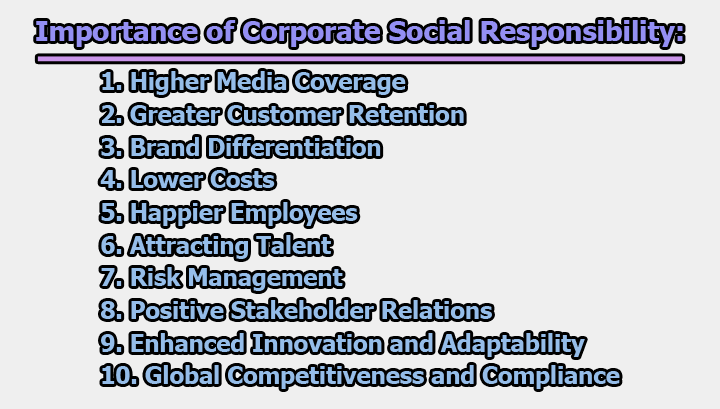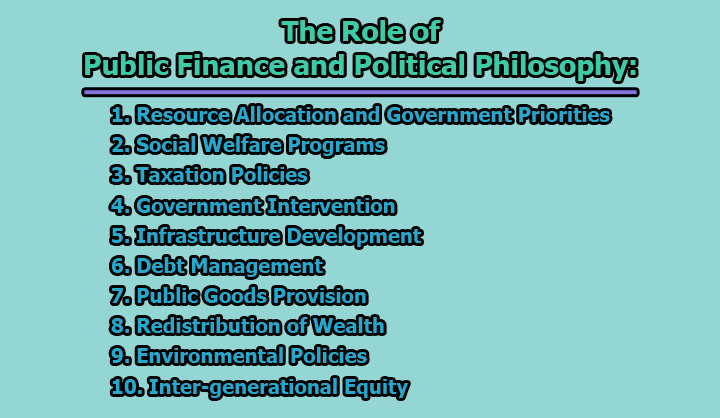Importance of Corporate Social Responsibility:
Corporate Social Responsibility (CSR) refers to a business practice that involves participating in initiatives that benefit society, the environment, and stakeholders beyond just maximizing profits. Companies engaging in CSR activities recognize that their operations impact not only shareholders but also the broader community and the planet. Here are some of the importance of Corporate Social Responsibility:
1. Higher Media Coverage: Companies that actively engage in CSR initiatives tend to attract more media attention. Journalists and media outlets often seek stories that go beyond traditional business practices, and CSR provides a compelling narrative. Media coverage can come in the form of news articles, features, interviews, or social media mentions. This increased visibility helps companies reach a broader audience and enhances their public image.
Positive media coverage can also create a positive feedback loop. As more people become aware of a company’s CSR efforts, the company gains credibility and trust in the eyes of the public. This, in turn, can attract additional media interest, creating a cycle that reinforces the company’s reputation and brand image.
2. Greater Customer Retention: Customers today are increasingly conscious of the impact of their purchasing decisions on society and the environment. Companies that actively demonstrate a commitment to CSR are more likely to earn the loyalty of socially conscious consumers. When customers perceive a company as socially responsible, they often feel a sense of connection and alignment with the company’s values.
CSR initiatives create a positive emotional association with the brand. Customers who identify with a company’s social or environmental mission are more likely to remain loyal, repeat their purchases, and even become advocates for the brand. The trust built through CSR contributes to a long-term relationship between the company and its customer base.
3. Brand Differentiation: In today’s competitive market, where products and services are often similar, CSR provides a powerful way for companies to differentiate themselves. When consumers are faced with multiple choices, they are more likely to choose a brand that goes beyond mere profit-making and actively contributes to social or environmental causes.
Brand differentiation through CSR is not just about having a unique selling point; it’s about building a distinct identity that resonates with consumers. Companies that stand out for their commitment to CSR are often perceived as more ethical, responsible, and caring, creating a competitive advantage that extends beyond the features and prices of their products or services.
4. Lower Costs: Engaging in CSR can lead to cost savings through various avenues. For example, adopting environmentally sustainable practices, such as energy-efficient technologies or waste reduction measures, can result in reduced operational costs over time. These initiatives not only benefit the company’s bottom line but also contribute to a positive environmental impact.
Moreover, companies that actively embrace CSR are often more resilient to changes in regulations and market expectations. By proactively addressing social and environmental issues, they can avoid costly legal challenges, fines, and reputational damage that might arise from non-compliance or unethical practices.
Additionally, cost savings can be realized through increased efficiency and productivity, as engaged and satisfied employees, supported by a positive CSR culture, tend to be more productive, leading to lower turnover and recruitment costs.
5. Happier Employees: CSR initiatives contribute significantly to employee satisfaction and well-being. Employees find meaning and purpose in their work when they see their company actively involved in making a positive impact on society and the environment. Knowing that their employer cares about social responsibility enhances the overall workplace culture.
Companies with strong CSR programs often report higher levels of employee morale, engagement, and retention. Employees are more likely to feel proud of their association with a socially responsible organization, leading to increased job satisfaction. This positive work environment fosters a sense of camaraderie among employees and can result in a more motivated and productive workforce.
6. Attracting Talent: In a competitive job market, attracting top talent is crucial for a company’s success. CSR serves as a powerful tool for attracting skilled and motivated individuals. Job seekers, especially younger generations, often prioritize working for companies that are socially responsible and aligned with their personal values.
A strong commitment to CSR can set a company apart as an employer of choice. Potential employees are attracted to organizations that not only offer competitive salaries and benefits but also demonstrate a genuine commitment to making a positive impact on society and the environment. This can lead to a more diverse and talented workforce.
7. Risk Management: CSR practices contribute to effective risk management by addressing environmental, social, and governance (ESG) factors. Companies that proactively identify and mitigate potential risks associated with these factors are better prepared to navigate challenges and crises.
By aligning business practices with ethical and sustainable principles, companies can reduce the likelihood of legal issues, regulatory fines, and reputational damage. This proactive risk management approach not only protects the company’s bottom line but also builds trust with stakeholders, including investors, customers, and regulators.
8. Positive Stakeholder Relations: CSR initiatives foster positive relationships with various stakeholders, including investors, suppliers, and local communities. Investors increasingly consider ESG criteria when making investment decisions, and companies with strong CSR practices are viewed more favorably.
Suppliers may prefer to collaborate with socially responsible partners, and local communities are more likely to support businesses that actively contribute to their well-being. Building positive stakeholder relations enhances a company’s overall resilience and sustainability by fostering a network of support during both prosperous and challenging times.
9. Enhanced Innovation and Adaptability: Embracing CSR can stimulate innovation within a company. A commitment to social and environmental responsibility often encourages employees to think creatively and find sustainable solutions to challenges. This mindset can lead to the development of innovative products, services, or business processes that align with the principles of CSR.
Furthermore, companies engaged in CSR are more adaptable to changes in market trends and consumer preferences. By staying attuned to societal needs and environmental concerns, businesses can proactively adjust their strategies and offerings, demonstrating a responsiveness that can be crucial for long-term success in dynamic markets.
10. Global Competitiveness and Compliance: In an increasingly interconnected world, companies with strong CSR practices enhance their global competitiveness. Many international markets and consumers prioritize socially responsible businesses. Adhering to ethical business practices, respecting human rights, and demonstrating environmental stewardship can positively impact a company’s standing on the global stage.
Additionally, as regulatory frameworks evolve globally to include more stringent ESG standards, companies that have already incorporated CSR into their business practices are better positioned for compliance. Proactively meeting or exceeding these standards not only reduces the risk of legal and regulatory challenges but also demonstrates a commitment to responsible global citizenship.
In conclusion, CSR is a multifaceted strategy that goes beyond philanthropy, encompassing ethical business practices, environmental sustainability, and social impact. Embracing CSR not only benefits society and the environment but also contributes to the long-term success and sustainability of businesses in an increasingly socially conscious world.

Library Lecturer at Nurul Amin Degree College










